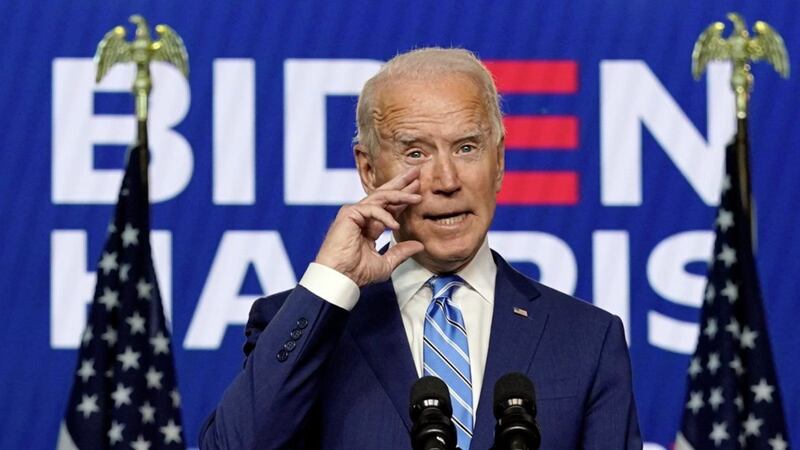THE question that matters about the US election - certainly for BBC Northern Ireland, which devoted a whole day to it - is what does it mean for us?
The answer is not very much. As President Trump's own envoy to Northern Ireland has repeatedly noted, there is a bipartisan consensus in Washington on Brexit, the border, the Good Friday Agreement and a UK-US trade deal.
Even changes in tone could cancel out. Trump might be on the way out but so is Democrat speaker Nancy "do not mess with the Good Friday Accords" Pelosi.
If there is any impact on our politics it will be indirect, via London and Brussels.
Some EU governments reportedly believed the UK was stalling and grandstanding over talks in the hope a Trump win would give it more leverage.
While this assessment could have been overstated, it will still affect the balance of negotiations.
However, the fact sea border preparations have continued throughout suggests any hardening or softening of an EU-UK deal was never going to make much difference here.
**
The housing reform plans announced this week by Sinn Féin communities minister Carál ní Chuilín are significant, positive and have support across the political spectrum.
But there may be one little problem getting them through Stormont.
In the latest register of members' interests, 22 out of 90 MLAs declare themselves to be residential landlords, including one quarter of DUP and Sinn Féin representatives.
There is no requirement to declare property owned solely by a partner or spouse so the true number of landlords in the assembly could be much higher.
Every MLA also represents a large number of small-scale landlords - there are roughly 40,000 in Northern Ireland, providing 20 per cent of all housing.
How will assembly members really feel about ní Chuilín's planned crackdown on low standards, high rents and insecure tenancies in the private rented sector, once the time comes to legislate for it?
It is easy to foresee some of her recommendations being watered down - for example, that the one-month notice to quit period for tenants be extended to six.
**
When Sinn Féin accepted three resignations last week over Covid payments resting in bank accounts, the party leadership appeared to have acted swiftly to shut down a crisis.
Things look less impressive after the further resignation of West Tyrone MLA Catherine Kelly, plus mystery over who has resigned in Upper Bann.
A long list of questions remain about how the party manages property, money and personnel and whether anything really changed as promised after the 2014 Sinn Féin office expenses scandal.
**
There were cross words at Stormont's finance committee when it examined one of the Covid payments, to the office of Sinn Féin MLA Maolíosa McHugh, who happens to sit on Stormont's finance committee.
McHugh challenged other members to make their allegations outside the committee's protection of privilege, which is the parliamentary equivalent of squaring up in a pub car park.
The assembly's code of conduct requires members with a potential conflict of interest in a committee inquiry to declare it and consider excusing themselves.
McHugh should have stepped outside then made himself available to be called back in as a witness.
**
Lobby group the Committee for the Administration of Justice seemed oddly put out in September when the secretary of state performed a routine appointment of the six commissioners at the Northern Ireland Human Rights Commission.
Now it has finally made its objection known. While not questioning the integrity of the six appointees, CAJ says "five have a distinctly public sector background" - perhaps the first time the rights sector has ever voiced this concern - and "three of the six have a RUC/PSNI (policing) background".
One of these is the PSNI's former diversity manager. The other two are former senior officers, one of whom become an EU diplomat and the other a human rights academic.
Overall, the composition of the commission is not so different from all its predecessors to warrant CAJ suddenly calling it "significantly state-centric".
It is invariably stuffed full of public sector worthies with criminal justice backgrounds.
**
Those hard-drinking party animals at the SDLP have come down strongly in favour of liberalising Northern Ireland's liquor licensing laws, denouncing the system as "archaic", "antiquated", "outdated", a general menace to the economy and an insult to our "values as an open, modern society".
A Sinn Féin bill to slightly relax restrictions, as agreed in January's New Decade, New Approach deal, was welcomed but described as "long overdue" and still falling well short of what is required.
"The SDLP has been pressing for reform for some time," the party noted.
Not noted was that the current system is due to a 2012 review of liquor licensing by then SDLP minister Alex Attwood, who demanded restrictions be more tightly enforced and added a few of his own.









